|
|
|
Sort Order |
|
|
|
Items / Page
|
|
|
|
|
|
|
| Srl | Item |
| 1 |
ID:
110539
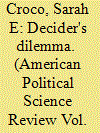

|
|
|
|
|
| Publication |
2011.
|
| Summary/Abstract |
A leader's culpability for involving his state in a conflict affects both his war termination calculus and his domestic audience's willingness to punish him if he loses. I define a culpable leader as any leader who either presides over the beginning of a war, or comes to power midwar and shares a political connection with a culpable predecessor. Using a data set created specifically for this study, I find that culpable leaders are more likely than nonculpable ones to achieve favorable war outcomes. I also find that domestic audiences will be willing to punish culpable leaders who lose, yet spare nonculpable leaders who do the same. Taken together, my findings underscore the need to appreciate more fully the role individual leaders play in bringing their states to war.
|
|
|
|
|
|
|
|
|
|
|
|
|
|
|
|
| 2 |
ID:
110537
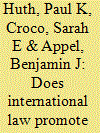

|
|
|
|
|
| Publication |
2011.
|
| Summary/Abstract |
In this article, we explain the role of international law in the resolution of territorial disputes from 1945 to 2000. In doing so, we focus on three outcomes of interest. First, when do states choose to revise the territorial status quo through negotiations instead of force? Second, when are states able to reach a final settlement? Third, when do states prefer a process of legal dispute resolution (i.e., adjudication or arbitration) to bilateral negotiations? To answer these questions, we argue that when the legal principles relevant to the dispute are unambiguous and clearly favor one side, a law-based focal point will emerge. This focal point, in turn, facilitates the settlement process by helping leaders overcome distribution problems, a central obstacle in reaching a final agreement. We find strong and consistent empirical support for our hypotheses regarding international law and peaceful dispute resolution.
|
|
|
|
|
|
|
|
|
|
|
|
|
|
|
|
| 3 |
ID:
146338
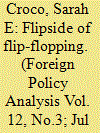

|
|
|
|
|
| Summary/Abstract |
In recent years, the term “flip-flopper” has become increasingly prominent. Politicians employ the term in an attempt to make their opponents look unattractive to voters. The question of whether this tactic works, however, remains unanswered. Existing research demonstrates that citizens do not like inconsistency as a matter of principle, but we know little about its effects in practice. In this paper, I conduct an experiment that allows me to ascertain the effect of a leader’s inconsistency on citizens’ assessments. Contrary to the conventional wisdom, I find that citizens do not always react negatively to a leader who changes his position. Instead, they are generally indifferent between a consistent and an inconsistent politician provided that the leader supports the citizen’s preferred policy in the current time period.
|
|
|
|
|
|
|
|
|
|
|
|
|
|
|
|
| 4 |
ID:
190018
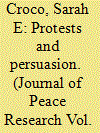

|
|
|
|
|
| Summary/Abstract |
How does the public respond to nonviolent resistance tactics? This survey experiment examines both approval and perceptions of legitimacy for five nonviolent tactics using a sample of American adults. We include two variations in our treatment – first examining responses to different protest tactics, then adding in the factor of co-partisanship, which we argue is a relevant identity in the US political context. In the non-partisan treatments, we find a stark dichotomy between our measures of approval and legitimacy. All nonviolent treatment tactics decrease approval for the neutral activist group using them, but three of four tactic treatments increase the probability that respondents will support our legitimacy indicators (congressional hearing invitation and media attention). We find that partisanship conditions how respondents evaluate nonviolent tactics of resistance, but not in ways we would expect based on the conventional wisdom that liberals favor ‘nonviolent resistance' while conservatives do not. Partisan alignment has a consistent effect on respondent approval of tactics in that the partisan treatment leads to disapproval of out-partisan groups across the nonviolent tactics (compared to no mention of tactic or partisanship). Surprisingly, however, this finding on co-partisanship does not extend to our measures of legitimacy. Partisanship clearly conditions the way that respondents evaluate nonviolent tactics of resistance, but not necessarily in predictable ways.
|
|
|
|
|
|
|
|
|
|
|
|
|
|
|
|
| 5 |
ID:
149516
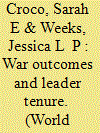

|
|
|
|
|
| Summary/Abstract |
A growing body of literature argues that war outcomes affect leaders’ tenure in office. But disagreement persists over how domestic political institutions translate performance in war into leader accountability. Some scholars argue that the tenure of democratic leaders is most sensitive to war outcomes, while others posit that autocratic leaders are more likely to be punished or rewarded for the outcomes of conflicts. The authors argue that existing research fails to take into account two important factors: whether the leader is viewed as culpable for the country's entry into the conflict, and whether the country features domestic institutions that make the leader vulnerable to removal from office, which varies greatly across nondemocracies. After taking leaders’ culpability and vulnerability into account, the authors show that the tenures of culpable, democratic leaders and culpable, vulnerable, nondemocratic leaders are sensitive to war outcomes. By contrast, the tenures of nondemocratic leaders who are less vulnerable to removal are not sensitive to war outcomes, regardless of their culpability.
|
|
|
|
|
|
|
|
|
|
|
|
|
|
|
|
|
|
|
|
|